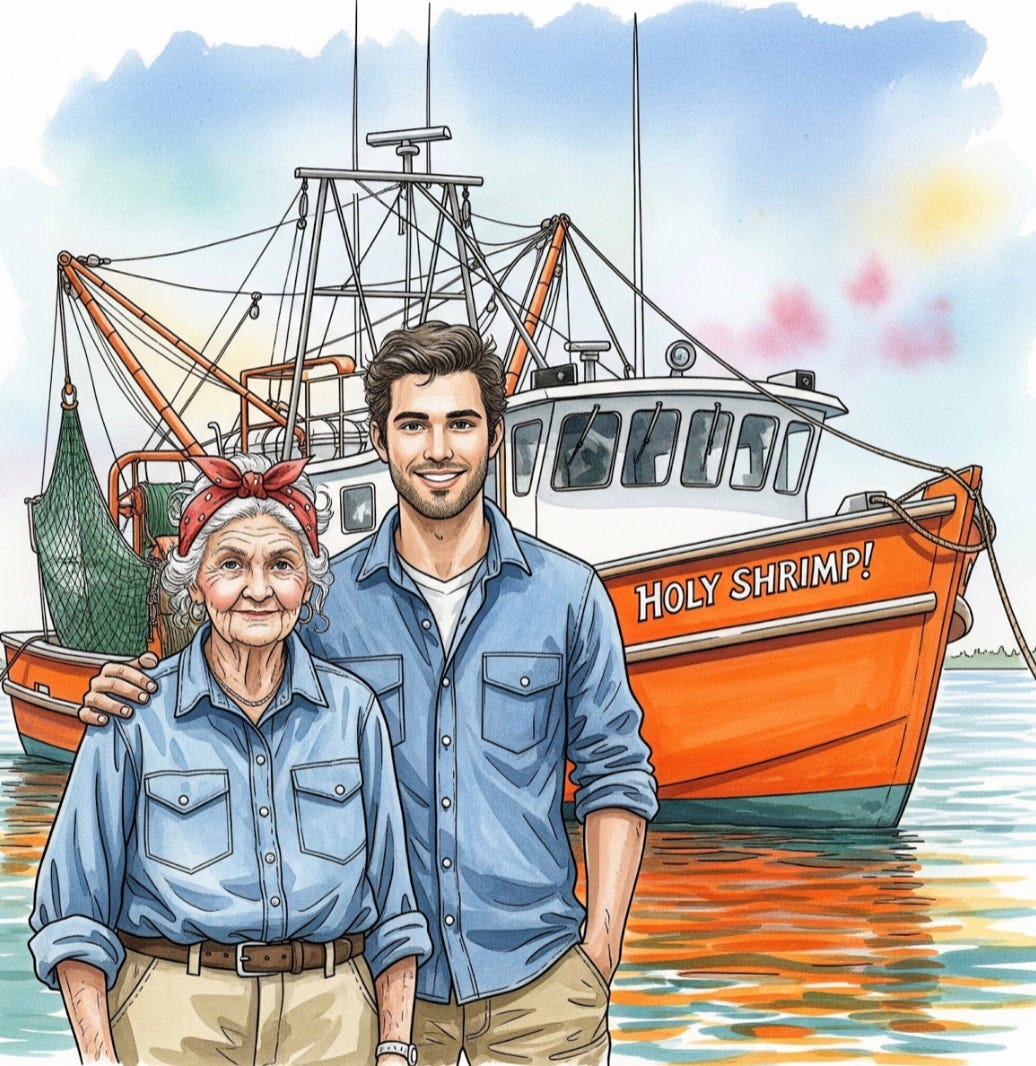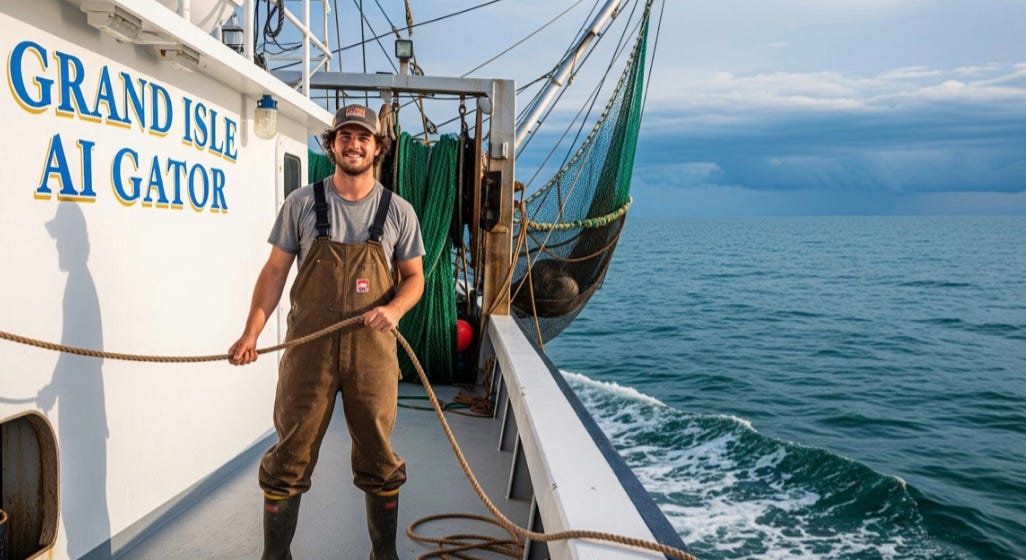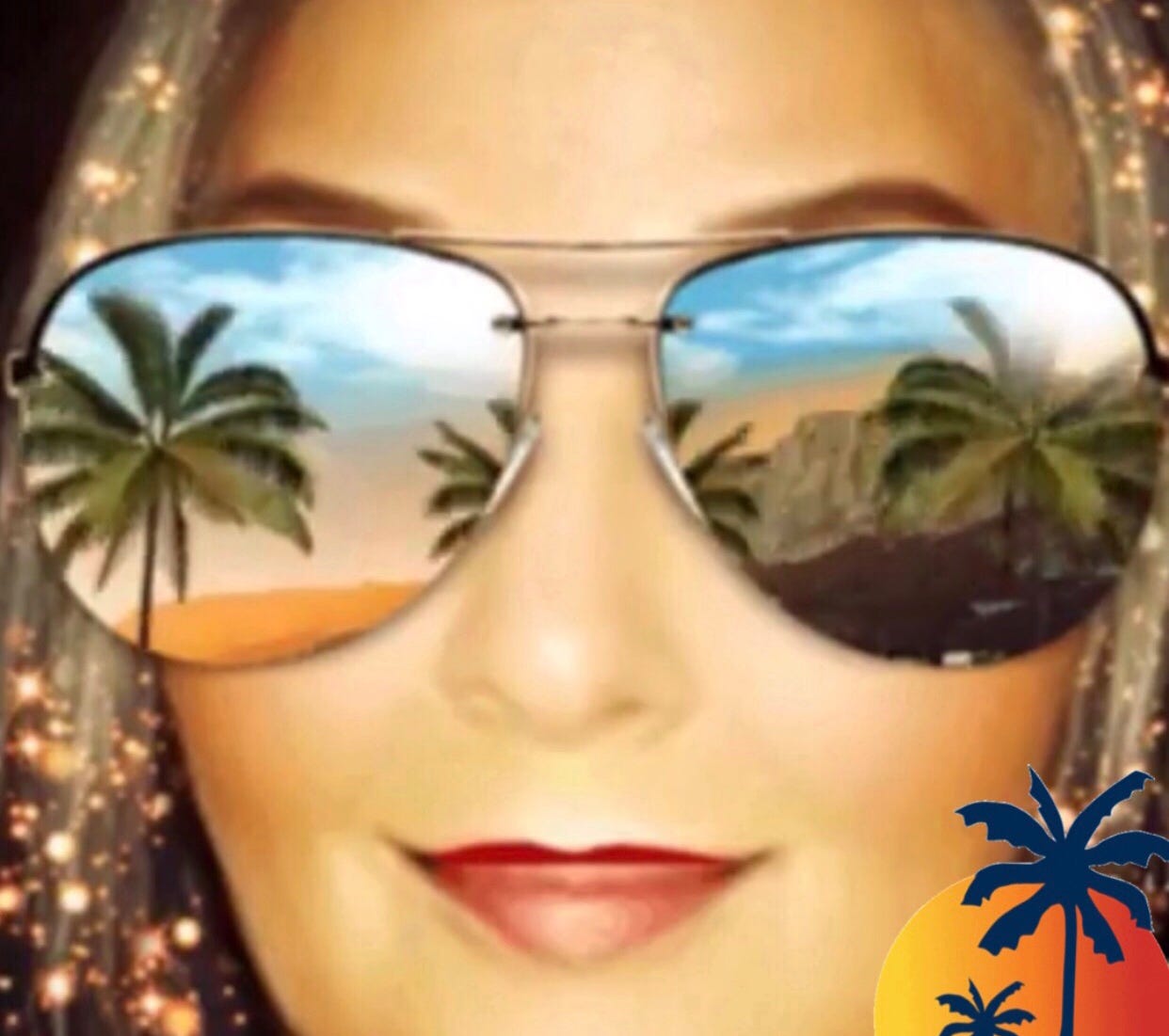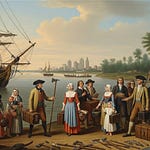CCJC Video Audio Podcast Episode 00087, Season 2

That Day The Only Thing Scarier Than AI Was An Unedited Alligator
"AI didn't replace his work. It showed him a new way to do it. It wasn't a monster after all. It was just a different kind of tool." – Ms. Odessa
In the high-tech, sun-drenched offices of Cajun Chronicles Podcast Corporation, a new kind of crisis had emerged, one far more human than a misplaced alligator. It started with an email. A listener named Ms. Odessa, a retired shrimper from Grand Isle, had sent a long, heartfelt message.
Her grandson, a talented young deckhand, had been laid off because the double rigger off-shore trawler company had just purchased AI-driven nets that could sort catches with frightening efficiency. "I'm scared," she wrote, her fear palpable even in a digital message. "This machine’ artificial learning stuff? I think taking the very soul out of our work. It's a monster."
The team, all twenty-two of them, sat in silent solidarity on this topic. They were no strangers to the anxieties of a changing world. They had embraced AI long ago, not out of a love for the cold logic of machines, but out of a deep-seated belief that it could be a tool for human enhancement.
For Jean-Baptiste “Calixte” Vogel, our chief audio engineer, AI was a partner. His haptic AI-driven device translated the sound of Ms. Odessa’s email into a series of textures, a poignant testament to a life spent on the sea.
For Emile Navarre, whose voice-to-text program flawlessly translated his poetic Cajun rhythms, AI was an enabler. For Jean Dugas, who used a neural interface to create intricate visual data, AI was a liberator, freeing up time to care for his daughter, Anastasie, with Friedreich’s Ataxia.
The team’s event coordinator leader, Pelagie Trahan, a woman who saw the digital world as a new bayou to be navigated with skill and respect, brought them together. "Ms. Odessa isn't alone in her AI fears," she said, her gaze sweeping across the diverse faces.
"Her fear is real. It's the same old fear of a new loom replacing a hand-weaver. We can't just talk about it, echoed by many about the wonders of AI, people don’t realize. We have to show it."
She looked at Jean Dugas. "Jean Dugas, you're the one who found ‘Jean Amable With The Golden Teeth's sound clip. What’s your take on this?”
Jean Dugas smiled, a hint of mischief in her eyes. "He wasn't a lurking error, Pelagie Trahan. The AI learned to recognize the sound of an gator as a natural part of our Louisiana soundscape, but it had no context for it. It's was an opportunity for us humans to give it context."
"Exactly," Pelagie Trahan said, a plan forming. "We're going to create a special episode. A ‘Jean Amable With The Golden Teeth' sequel episode. But we're not just going to make him a scary funny guest. We're going to use him to demonstrate how AI works, and how it can be a partner, not an enemy."
The team sprang into action. They all used their AI tools not just to edit, but to educate. It’s not to replace original content but a way to quickly research. It’s only as good as the questions you ask it. Emile, dictated a script, his voice-to-text program effortlessly translating his philosophical musings on the nature of progress.
"The old ways? They don't have to die," his AI transcribed with perfect grammar. "They can just evolve.They are real, AI can’t replace creativity or genuine empathy. Like a cypress tree's knees growing into new shapes around the old ones. It’s a great way to adapt to new technology."
Calixte, using his tactile interface, collaborated with the AI to create a soundscape that wasn't just a podcast, but a lesson. He had the AI isolate Jean Amable With The Golden Teeth's sound clip, then use that data to create a sonic map of the bayou, showing how a single, seemingly chaotic sound was part of a larger, beautiful ecosystem.
"The AI isn't replacing the gator," Calixte announced, "It's helping us understand its place in the world."
Jean Dugas, using his neural interface, created an interactive visual that allowed listeners to see the sound waves, to manipulate them, and to understand how the AI had been trained to recognize different species of birds, different tones of human speech, and even the "voice" of a shrimper’s net.
They also used the AI to research Ms. Odessa's grandson's possible new job prospects, finding a program that trained former fishermen to use the same AI-driven technology for marine research and conservation. Some of them were already rejoining their former companies with their new found skill sets.
The final episode, titled "Jean Amable With The Golden Teeth & the Digital Bayou," is destined to be a hit. Its’s was funny, with the alligator's now-contextualized growl perfectly punctuating a segment on the future of seafood harvesting. But it was also deeply serious and profoundly hopeful.
They had taken a listener’s fear and used their high-tech tools to turn it into a beacon of possibility. The email they received from Ms. Odessa, two weeks later said it all: "My grandson is starting a new job, thanks to your story. Better pay, better benefits.”

AI didn't replace his work. It showed him a new way to do it. It wasn't a monster after all. It was just knowing how to use a different kind of tool because every AI driven machinery needs a tech who both understands the technology and what shrimping is all about.
The Great Swampy Bayou of Progress
Life, our friends, is like the Mississippi River. You can stand on the bank and shake your fist at it all you want. You can curse its current and wish it would stay in the same place forever, but that river is going to keep on flowing. It's going to change its course, create new channels, and reshape the land with or without you.
Now, technology? It’s a global connected bunch of new rivers. It’s not just a little creek that you can step over. It’s a powerful vast system of fast-flowing waterways carving out the future. Some folks want to build a little shack on the bank and pretend it's not there, hoping the water won't reach them. But eventually, the water will find a way, and their shack will be floating downstream with the gators.
The smart people? They don't fight the waters. They grab their pirogues and learn how to paddle. They build levees to protect what they cherish, if possible. They build mills to harness its power. They use the world’s waters to get where they need to go. They learn the currents, respect the forces and figure out how to live with it, not against it.
AI is that digital version of water management that is all so powerful in systems of water ways. It's coming and it's already powerful. We have a choice. We can sit on the bank and watch our ways of life get washed away. Or we can get in the boat, grab the paddle, and learn to navigate.
We have to learn its currents not to destroy it, but to steer it towards a good, responsible and ethical destination. The responsibility isn't to stop the currents, it's to make sure it feeds the crops, but not floods or wash away the towns It's to make sure we're the ones holding the paddle.
A Word of Wisdom:
Our fictional and non-fictional tales are inspired by real Louisiana and New Orleans history, but some details may have been spiced up for a good story. While we've respected the truth, a bit of creative license could have been used. Please note that all characters may be based on real people, but their identities in some cases have been Avatar masked for privacy. Others are fictional characters with connections to Louisiana.
As you read, remember history and real life is a complex mix of joy, sorrow, triumph, and tragedy. While we may have (or not) added a bit of fiction, the core message remains, the human spirit's power to endure, adapt, and overcome.
© Jerilee Wei 2025 All Rights Reserved.











